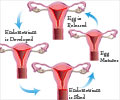Irregular periods was found to be higher in girls with type 2 diabetes, a new study found. Girls with type 2 diabetes need to be assessed for menstrual problems regularly.

‘Menstrual irregularities were found to be higher among girls diagnosed with type 2 diabetes. Girls with type 2 diabetes have to be periodically assessed for menstrual problems.’





"It's important for girls with type 2 diabetes to be assessed for menstrual problems," said the study's main author, Megan Kelsey, M.D., M.S., of University of Colorado School of Medicine in Aurora, Colo. "Infrequent periods can be associated with heavy and painful periods, increased risk for fatty liver disease, fertility problems and long-term increased risk for endometrial cancer."The research team performed a secondary analysis of the data from the Treatment Options for Type 2 Diabetes in Youth (TODAY) study, a nationwide research study to find the best way to treat young people with type 2 diabetes.
The new analysis focused on evaluating the frequency of menstrual irregularity in girls with recently diagnosed diabetes and whether the addition of intensive lifestyle or rosiglitazone to previous treatment with metformin helped to improve symptoms. These treatments are often used to treat both diabetes and PCOS.
The research team found that more than 20 percent of girls in the TODAY study had irregular periods. Many of those girls also had high testosterone levels, pointing to PCOS as an underlying cause. Not all the TODAY girls with irregular periods had elevated testosterone, suggesting other causes for menstrual dysfunction.
Despite two years of intensive treatment with either metformin alone, metformin and lifestyle changes, or metformin and rosiglitazone, the participants still had significantly irregular periods.
Advertisement
Source-Eurekalert















